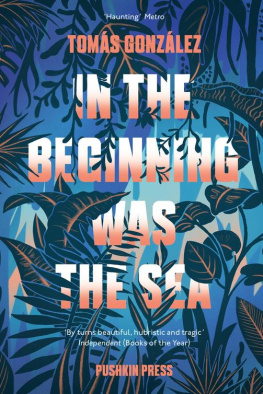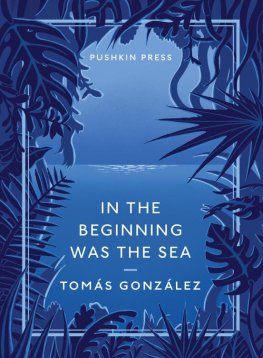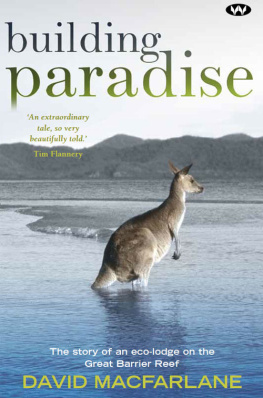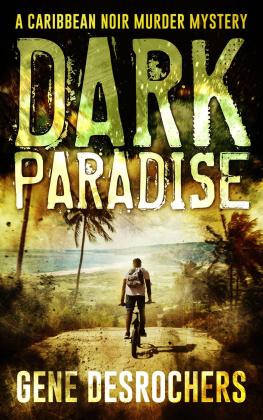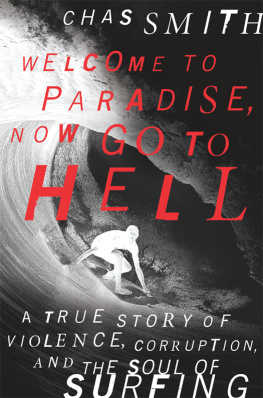T HE LUGGAGE was transported on the roof of the bus. Two leather suitcases containing their clothes, a trunk containing his books, and her sewing machine. Their belongings were surrounded by bunches of plantains, sacks of rice, blocks of unrefined sugar cane wrapped in dried banana leaves, and other suitcases.
Elena and J. were heading for the sea.
There were stops in dusty villages. Elena and J. got out of the bus, numb, drank coffee in bars that smelt like urinals where pot-bellied men sat steeping their endless entrails in the golden glow of beer. There were stops in dismal, dirty service stations littered with discarded engine filters and empty oil cans where the bus would fill up with petrol before setting off again. By day, the bus picked up passengers carrying bewildered chickens; at night, empty-handed individuals boarded the bus in dark, desolate places only to get off in equally dark and desolate places twenty or thirty kilometres further on. Silent men with machetes slung from their belts and dirty, battered hats on their heads.
When, finally, the bus arrived at the port, the sea was not magnificent and blue. The harbour was built on a narrow inlet that looked more like a canala filthy canal three kilometres long that spilt into the sea. At 4 p.m. the bus pulled in to the main plaza. There was no sign of the sea, though the air smelt of salt and the fetid stench of open drains. The tall almond trees in the middle of the plaza were wheeled about by flights of swallows. Amid the trees, perched on the backs of granite benches, people sat chatting. The undersides of the granite benches seemed eroded. In the shade of the trees were kiosks selling fruit juice; split papayas, their exposed bellies gorged with seeds and teeming with flies; large glass jars filled with cubes of mango ready to be liquidized.
Parked all around the plaza were lines of Jeeps. Some looked new, but most were rusty broken-down Willys half eaten by rust or clapped-out Gaz or Carpatis. The newer models had metal drivers cabs with small red or blue fans mounted on the dashboard while older models sported grubby statues of a saint next to the steering wheel and faded, patched tarpaulin roofs.
The dusty streets around the plaza would become quagmires in the rainy season. Traffic was heavy: trucks full with packages arrived as the jeeps teeming with passengers left. Garishly painted buses pulled up, their roofs piled high with live chickens, multi-coloured tin trunks and bunches of plantains.
The squat buildings of concrete and brickmostly grain stores and seedy barswere roofed with corrugated iron or asbestos tiles. There was no attempt at elegance or style; the walls themselves were grimy. The people teeming on the plaza were ugly: the white men were garrulous, potbellied traders with a yellowish tinge to their skin; the blacks, raised far from the sea and cheap fish, had prematurely rotting teeth.
You get the bags unloaded and Ill go see about a boat.
OK, said Elena, then yelled up to the boy, Hey! Careful with our luggage, hermano!
Her sewing machinethe one thing that she had kept from her first marriagehad spent almost twenty hours riding on the roof of the bus. The wooden case that housed the mechanism was wrapped with cardboard boxes held in place with packing tape and twine; the feet and the pedal were exposed.
It tumbled to the ground with a dull clatter.
Elena unleashed a torrent of hurried, confused abuse before composing herself and calmly swearing at the boy, choosing her insults with silky venom.
It aint my fault, seo, the boy said simply.
L EAVING THE PLAZA , J. threaded his way through the dusty streets. After a few blocks, the brick and concrete buildings gave way to wooden shacks mounted on short piles and the crawlspace underneath the houses teemed with chickens, pigs and children. He arrived at the docks. Here, finally, he could see the water, but this was stagnant water, rippled only by a slow, oily swell. There was not a single gull, not a single gannet, nothing that evoked the sea. Motorboats were moored next to short, worm-eaten wooden wharfs swollen with damp. The supporting posts were green with slime where they had been lapped by water and warped where they were covered at high tide while, above, the jetties were dry and splintered. The long, narrow boats that wereor had once beenpainted in bright colours seemed weighed down by their huge outboard motors. On some, sweaty black men in cut-off jeans, their expressions solemn and grave, delved into the entrails of the engines.
Do you own this boat? J. asked one of them.
Shes mine, but shes not working, the black man said without looking up.
Who can we talk to about getting to Sever?
The boatman did not answer immediately but went on rummaging in the belly of the engine.
How many passengers? he asked finally.
Two.
How many bags?
One heavy trunk, two suitcases and a sewing machine.
Three boatmen wandered over.
Where you headed?
To a big estate, a finca.
How many bags?
A trunk and a few other bits and pieces, said J., wearily, knowing they had already overheard his conversation with the man tinkering with the engine.
When yet another boatman appeared and asked how many were travelling, J. became irritated. Just then, the man with the malfunctioning engine leapt nimbly onto the jetty and came towards him.
Julito can take them, he said.
Julito! chorused the other men.
Lets go, the first man said curtly.
J. watched as he strode ahead through the dusty streets. After three blocks, they came to the covered market, an imposing building tiled with asbestos cement. To one side of the plaza, men were loading a truck with cured fish while the driver, leaning against a wall, idly watched the proceedings. The windows of the truck were plastered with colourful decals of women in swimsuits and Stetson hats.
How much would it cost us to take an express boat? J. asked as they arrived on the market square, walking across gangplanks laid on the ground.
This timber corridor was lined on either side by grain stalls and J. constantly had to stand as men passed with heavy sacks balanced on their shoulders, their shirts protected by red flannel bayetillas.
Depends.
Depends on what? asked J.
On Julito, said the black man.
Having passed the grain stalls they came to the fritanguerasthe fried food stallswhere sweaty, plump women dropped thick pieces of fish into enormous frying pans. Laid out on the wooden trays that served as counters, the fillets of fried fish immediately cooled to take on an almost mineral appearance while thick slices of fried plantainpataconeswere heaped around them. J. hungrily began to imagine the slap-up feed of pescado y patacn they would have once he had made arrangements for the boat.
As they came to the end of the walkway, the black man disappeared through a door into one of the fritangueras. When J. caught up, he saw the boatman sitting at the back. At the counter, a fat, sullen woman with a huge knife was chopping green plantains. Behind her were five large tables surrounded by long wooden benches, everything painted a pale green. The black boatman was sitting at one of the tables chatting to a short man who was also black. Aside from the boatman and the short black manJulito, probablythe only customer was an old man slowly eating chicken and potato soup.

